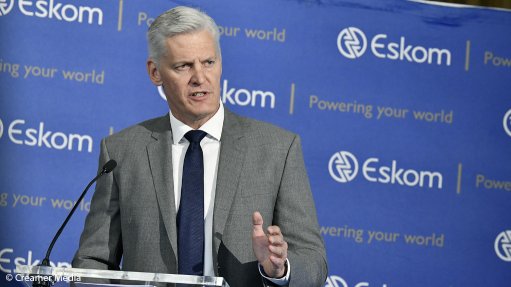
Eskom CEO André de Ruyter
Photo by: Donna Slater
Eskom is working to avoid load-shedding for the election season, says the power utility's CEO André de Ruyter.
De Ruyter was speaking during an interview with eNCA on Wednesday morning. The power utility last week Thursday introduced stage 2 load-shedding. At the time Eskom was working on returning four units at its Tutuka power station, which experienced conveyor belt failures and boiler tube leaks.
There had also been breakdowns at the Kusile, Komati and Hendrina power stations. Eskom announced that load-shedding would continue until Thursday, 14 October, while it works to replenish emergency reserves.
De Ruyter on Wednesday affirmed that Eskom was working on repairs. "Our current planning is that we will lift load-shedding by tomorrow morning, and that should enable us to go into election season - very important from a democratic process perspective - without any load-shedding going forward," he told eNCA.
"We are planning very carefully to do everything in our power to ensure there is no load-shedding during elections," he emphasised. Eskom is bolstering its reserves and repairing known defects to minimise load-shedding on election day, which will be on 1 November.
He explained that Eskom was well prepared for the rainy season and that the reason for the current lack of capacity was linked to an explosion at Medupi unit 4, a fire at Kendal unit 1, and two conveyor belt failures at Tutuka. He said that once the repairs at Tutuka were complete, the utility would be in a position to meet demand.
Asked about whether South Africa will have a dark Christmas, De Ruyter said that demand over the holiday season is usually low, and that Eskom did not anticipate load-shedding over Christmas.
For the long term, there is a shortage of generation capacity of between 4 000 MW and 5 000 MW. Additionally, the power-generation system is susceptible to breakdown and failure.
"Once we have that capacity added to the grid, we see that there will be a significant improvement in the stability of power generation," he said.